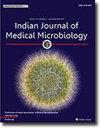A study on the effectiveness of an antifungal stewardship program in immunocompromised patients in a tertiary-care teaching hospital: The antifungal stewardship (TAFS) study
IF 1.4
4区 医学
Q4 IMMUNOLOGY
引用次数: 0
Abstract
Introduction
Anti-fungal stewardship (AFS) is a neglected aspect of antimicrobial stewardship programs. This study aimed to examine the effectiveness of an AFS program to ensure rational prescribing of antifungals via a post-prescription review and feedback method.
Methods
In this prospective, interrupted time series analysis, AFS was done on adult patients admitted to the department of hematology in a tertiary care hospital in South India. In the pre-intervention phase, patients on anti-fungal therapy for more than 48 h were identified and baseline data was collected. In the intervention phase, patients on antifungals for >48 h were assessed by an AFS team including an infectious diseases specialist and appropriate recommendations were made regarding modification or discontinuation of the antifungals where required. Acceptance of the intervention by the treating team and clinical outcomes were recorded.
Results
A total of 193 courses of antifungal therapy in 152 patients were analyzed over 6 months, of which 107 courses belonged to the pre-intervention phase and 86 were in the intervention phase. In the intervention phase, the AFS teams recommended that 15 (17.44 %) of antifungal prescriptions be modified. Among these, 66 % of the recommendations were accepted by the treating physician. Days of therapy per 1000 patient days were calculated for each individual anti-fungal drug and there was a significant reduction in consumption of antifungals, particularly voriconazole, posaconazole and echinocandins in the intervention phase. There was no statistically significant difference in the in-hospital mortality [26.16 % vs 23. 25 % (p = 0.64)] between the two groups.
Conclusion
In this study, a focused post prescription review and feedback in an antifungal stewardship program appeared to significantly decrease the prescription of antifungal medication without adversely affecting patient outcomes.

三级护理教学医院免疫功能低下患者抗真菌管理方案的有效性研究:抗真菌管理(TAFS)研究
抗真菌管理(AFS)是抗菌药物管理计划中一个被忽视的方面。本研究旨在通过处方后审查和反馈方法,检验AFS计划在确保抗真菌药物合理处方方面的有效性。方法在这项前瞻性、间断时间序列分析中,对印度南部一家三级医院血液科收治的成年患者进行AFS。在干预前阶段,确定抗真菌治疗超过48小时的患者,并收集基线数据。在干预阶段,由包括传染病专家在内的AFS小组对使用抗真菌药物48小时的患者进行评估,并在需要时就修改或停止使用抗真菌药物提出适当建议。记录治疗组对干预的接受程度和临床结果。结果分析152例患者6个月内共193个疗程的抗真菌治疗,其中107个疗程属于干预前阶段,86个疗程处于干预阶段。在干预阶段,AFS团队建议修改15份(17.44%)抗真菌处方。其中,66%的建议被治疗医师接受。对每种抗真菌药物计算每1000患者日的治疗天数,在干预阶段,抗真菌药物的用量显著减少,特别是伏立康唑、泊沙康唑和棘白菌素。两组住院死亡率差异无统计学意义(26.16% vs 23%)。25% (p = 0.64)]。结论:在本研究中,在抗真菌管理项目中,集中的处方后审查和反馈似乎可以显著减少抗真菌药物的处方,而不会对患者的预后产生不利影响。
本文章由计算机程序翻译,如有差异,请以英文原文为准。
求助全文
约1分钟内获得全文
求助全文
来源期刊

Indian Journal of Medical Microbiology
IMMUNOLOGY-
CiteScore
2.20
自引率
0.00%
发文量
154
审稿时长
73 days
期刊介绍:
Manuscripts of high standard in the form of original research, multicentric studies, meta analysis, are accepted. Current reports can be submitted as brief communications. Case reports must include review of current literature, clinical details, outcome and follow up. Letters to the editor must be a comment on or pertain to a manuscript already published in the IJMM or in relation to preliminary communication of a larger study.
Review articles, Special Articles or Guest Editorials are accepted on invitation.
 求助内容:
求助内容: 应助结果提醒方式:
应助结果提醒方式:


